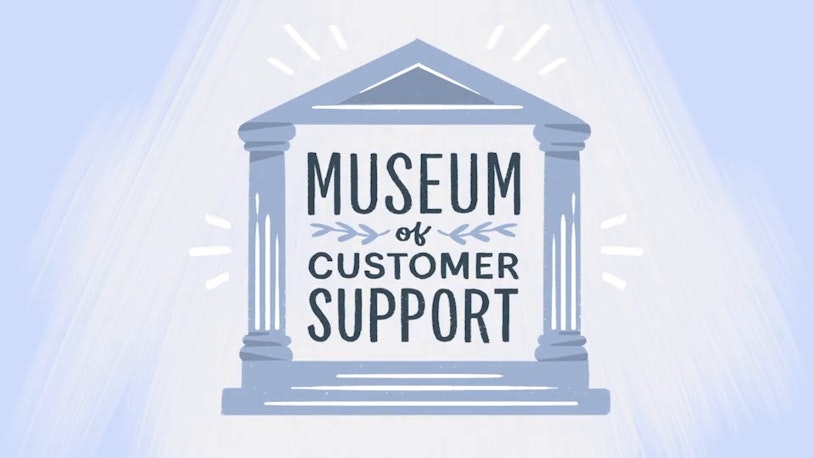An ancient support complaint, Eliza’s no saint, Blockbusters, car combusters, Comcaster disasters, and a “Don't Ask, Don't Tell” motel.
It's “The Greatest Mistakes in Customer Service History” on The Supportive.
Six incidents of spectacularly bad customer service, each terrible in its own unique way. Today we're going to visit them all with the help of this handy time machine and the magic of podcasting.
Hop in!
For our first stop we're going way back to 1750 B.C., ancient Mesopotamia, somewhere around where southern Iraq is today.
And we're in the house of the only famous copper trader in history, Ea-Nasir.
Look, there he is. He's reading a clay tablet that contains a complaint letter from his customer, Nanni.
And this is what Nanni says in the letter.
“Take cognizance that (from now on) I will not accept here any copper from you that is not of fine quality. I shall (from now on) select and take the ingots individually in my own yard, and I shall exercise against you my right of rejection because you have treated me with contempt."
Too Long; Didn't Translate from Akkadian?
Essentially, he says, "You gave me some low-quality copper ingots. I want my money back."
So will Ea-Nasir give Nanni that money back? It's possible.
We'll just have to leave him to think about it.
We're traveling forward in time to the 1920s A.D.
Forward in time, but not in space.
We're still in Ea-Nasir's house, but it's being excavated now by the British archaeologist Sir Leonard Woolley.
Sorry, if you could just all shuffle around a little bit, Sir Leonard's just telling us to get out of the way.
We're blocking his view of a pile of clay tablets in the corner. It turns out those are also customer complaints.
So, at this stage, we can assume all of those people would have been Net Promoter Score detractors.
What can we learn from Ea-Nasir's mistakes?
Well, firstly, complaints definitely travel further than compliments do. In this case, all the way around the planet, and over four millennia in time so far. You never know which complaint is the one that will haunt you for eternity.
And secondly, we learned that customer service fundamentally doesn't change that much.
That complaint letter, really, it could have been about some off-brand copper ingots that you bought on wish.com last week, couldn't it?
Customer care will always be necessary.
Everyone, hop back in the time machine, please.
We are leaving Sir Leonard to his important work, and we're heading to 1966.
We've landed now on the MIT campus in Cambridge, in the office of Professor Joseph Weizenbaum.
And the professor is figuring out something important here, something that we will all use in 2024.
Natural language processing.
And he's hard at work [ Work, work! ] on his new project, which he calls...
[ Eliza! and Peggy] Well, no, just Eliza.
And it's not named after the Schuyler sister, but instead the character from My Fair Lady.
And this Eliza is a sort of pseudo-psychotherapist.
You type in whatever you like to Eliza, and Eliza will respond with some open-ended questions or some reflective statements.
It's intended to encourage you to have a conversation with the computer.
And Professor Weizenbaum, when he came up with it, he thought “this will be an obviously simplistic system, but it will help people think about how language works”.
But right now, in 1966, he's just shown Eliza to his secretary. And she loves it so much that she genuinely asked him to leave the room so that she and Eliza could have a private conversation.
And this has got the professor pretty disturbed.
He really sees this as a dangerous situation for people to think that computers could actually care about them when they literally could not care any less.
Or any more.
But is this a customer service mistake? Well, no, it's not.
Not yet.
But as we leave 1966 in our time machine, (which by the way I imagine looks like the TARDIS, but instead of an old police box it's more like a customer service booth that you see at an old train station), you will see that Eliza gives birth to generations of chatbots from the most basic decision tree ones right through to today's conversational, AI-driven bots, and including all of those poorly implemented and tedious customer support chatbots.
The ones that can't understand anything at all once your problem goes off the specific path that they planned for.
All of that starts right here, with Eliza.
And Professor Weizenbaum will go on to spend the rest of his career trying to tell people not to misunderstand Eliza, not to go down this path of anthropomorphizing computers…and he will not succeed.
Lessons from Eliza:
First, people are really easily convinced that there is a mind on the other end of any sort of conversation, even when they absolutely know that there isn't.
And that's a problem for all sorts of AI-generated conversational interfaces once we let them loose on customers.
But also, we see technology is not neutral.
It doesn't really matter what it was intended to do, because the impact that it has is so shaped by the society in which it's built and released that it's really hard to predict, and potentially hard to control.
But now it's time for us to make like Hamilton and move on from Eliza.
We're heading north, to Detroit.
We're visiting Lee Iacocca, who is right at this moment, in the late 1960s, the president of Ford Motor Company. And Lee has a problem.
Japanese and German carmakers are making lighter, more fuel-efficient cars. They're eating up Ford's market.
Iacocca wants Ford to make their own equivalent model, but usually that would take three, three and a half years.
He wants to do it in two years. And that's going to mean doing things in new ways, and in a bit of a rush.
And possibly that is the root cause of this problem that Ford has just discovered with the Ford Pinto.
They've seen in their testing that even in quite low-speed collisions, the Pinto sometimes will catastrophically catch on fire, and indict the gas tank.
So Ford has a decision to make.
Do they keep pushing hard, try to hit that early deadline, knowing that there is this real danger there? Or do they pause and redesign, spend a bit more money, and come up with something which is safer, but will take longer to get to market?
Well, you can guess what they'll decide to do.
And because of that decision, at least 26 — and maybe a lot more — people will die in terrible car accidents.
And in all of the lawsuits in the following decades, it will turn out that perhaps the Pinto was not on average that much more dangerous than other similar cars of the time, but also that Ford definitely knew about this issue, and had just decided that the cost of maybe $8 to $10 per car to remedy the issue was too much to bear.
And to make matters worse, Ford also spent millions of dollars lobbying to delay the introduction of the stricter safety standards, which would eventually force them to change their designs.
A customer-hostile action in the most literal and most terrible sense.
So from Lee, Iacocca, and Ford, we can learn a couple of things.
You cannot separate customer service from the culture of the company.
It just does not matter how friendly the people are who are selling you the car, or how nice the mechanic is.
If the company internally is making products which are actively dangerous and deadly to the customer base, and deciding that that's okay. Nothing the customer service team can do will make a real difference, once that happens.
But as we get back on board and we leave Ford behind, just take a look out the left-hand window.
You'll see the executives of Philip Morris there.
They also spent decades lobbying against the idea that their cigarettes were killing people, a fact which they absolutely had already verified for themselves.
But we don't have time to stop for them, we've got to get to Dallas, Texas.
Because we're going to Blockbuster, which in the year 2000, where we are now, is absolutely massively profitable.
Now if you're not of a certain age, you might not even know what Blockbuster was.
Basically, it was like a movie streaming service, except one where the download speed was limited by how long it took you to drive to the physical store and find the right bit of plastic.
Ask your parents for details.
But right now, at the start of the new millennium, things are changing.
Netflix has arrived, it's got mail-order DVDs (ask your parents).
But it's not yet doing very well. In fact, right at this point it is very close to collapse.
So close that the Netflix founders have come today to the Blockbuster headquarters to beg to be acquired. All they want is $50 million.
And yeah, that sounds like a lot, but for comparison purposes, Blockbuster at this time is making $800 million a year, not from renting videos, just from the late return fees on renting videos.
But as we watch this meeting from the corner of the room, out the door of our time machine, which is invisible, I forgot to mention that before, the Blockbuster executives say "no chance" and they kick Netflix out of the room.
It's the year 2000.
In ten years, 2010, Blockbuster will be bankrupt, Netflix will be worth $100 billion. [ "100 billion dollars! Gentlemen, silence!" ]
Massive business mistake, for sure.
But is that a customer service failure?
I say yes, because Blockbuster just didn't really understand their customers.
The internet and streaming had already arrived at this point, and the smaller, nimbler Netflix, were able to extend their business from DVDs in the post to movies over the internet, and that is something which in so many ways is a huge customer service improvement.
There's no need to pay for late fees when you forget to bring back your copy of “Shrek Forever After”.
There's no need to fight with your neighbors for that one copy of “The Tooth Fairy” starring Dwayne "The Rock" Johnson that your kids, for whatever reason, need to watch tonight.
More choice, less hassle.
Streaming took off for good reason once it was technically possible.
But Blockbuster will leave it too late, and by the time they decide they should start their own streaming service, Netflix already has a huge lead, and Blockbuster has incurred massive debts, they totally lost sight of the customer experience, and they collapsed.
Lessons from Blockbuster.
A customer that is only with you because there is no more convenient option is not necessarily the same thing as a loyal customer. They'll leave as soon as something else pops up that's better.
If you're already making a ton of money doing something which is working, it is so hard to shift a company around, even if the people internally can fully see what is happening, which I'm sure they did.
Blockbuster was weighed down by that $800 million dollar golden anchor of late fees.
If you're interested in learning more about the very last Blockbuster and how the whole Blockbuster chain collapsed, well, Netflix has a good documentary.
Hop back in, we're going to do a quick time jump to 2014 Pennsylvania.
Before we get started here, I just need to inform you...
[ “This call may be monitored or recorded for quality assurance or training purposes.” ]
How many times have you heard that? I've personally not seen a lot of evidence that anyone does ever listen to those recordings.
Except for this one recording that's happening right now. It will go on to rack up over 6 million plays.
We're listening to Ryan Block as he attempts to close his Comcast account.
Ryan really wants to cancel, but that retention professional on the other end of the call refuses to let him do so.
This call will go on for 10 minutes.
It is genuinely painful to listen to.
And when Ryan's recording of the call becomes public, Comcast is going to throw that customer service person under the bus so fast that they could have been shooting a speed remake for Netflix.
They say "This is unacceptable. It's not consistent with how we train our customer service reps."
I would bet that this is absolutely how Comcast trained their reps. They're just embarrassed to be caught out. And of course there's nothing wrong with customer retention.
Everybody knows it is good business to try and hold on to the customers that you already have.
But there is a difference between retention by offering a better deal or by figuring out what someone really needs and getting them that, and retention by just refusing to let them leave.
Because that is not retention, that is corporate hostage taking.
And if that's what you're into, we can probably stop off back at a Blockbuster, pick up a Liam Neeson movie.
[ “It was all business. It wasn't personal.”...”It was all personal to me.” ]
From Comcast's customer-hostile retention efforts, we learned that policies that are absolutely making you a ton of money might also be undermining your entire business and costing you in the long run if you're not paying attention.
And we learned that you need to be careful of the incentives you create for your customer service team.
If you have trained them so that only retention matters, they will do what it takes to retain customers.
Alright, we've got time for just one last stop on our temporal tour of tragedies.
And conveniently for me, this one is really close to my home.
It's just about an hour down the road.
We're at a little beachside motel in the town of Mollymook, and it's March of 2020.
Just before some other world events that will soon somewhat overshadow customer service. We're at a budget motel, and our customer Sharon has just checked out after two nights.
Here she is, submitting her review on Booking.com.
“Good location. Room was a bit noisy. View was quite nice. Room served the purpose.
Was surprised that the room was not serviced as I stayed for two nights. Not sure if that's what they normally do, or it was just overlooked.”
She gives it a 6 out of 10. Not great, but not terrible.
87 people give it a thumbs up as a useful review, but at least one person finds it unhelpful.
And it's the motel manager.
So let's watch her now, as she's sending an updated invoice to Sharon.
You'll notice that she's added one new line item, which says, "50 dollar charge for false review".
[ "Emotional damage!" ]
Now, Sharon sees this, and understandably, she's not super impressed.
She jumps onto Facebook to complain about it, it picks up some attention, and a lot of people start seeing this complaint.
And of course, the motel owner at this point realizes, "Well, this isn't a good look for me, I'll just quietly back down and pretend that didn't happen".
And that's exactly what she does not do.
Instead, she'll hop onto Booking.com and reply with a giant, zero-punctuation, full-rant response to that original review.
And presumably in her head, she's thinking people will read that, see that we're in the right, the customer's wrong, and yes, of course we should have charged them 50 dollars for this false review, and threatened them with legal action.
And once everybody understands that, they will most definitely come and stay at my excellent motel.
Listener, that is not what's going to happen.
Instead, the motel will get briefly Streisand-Effected right out of existence through all that bad publicity, before it later reopens.
Lessons from the Oceanview Motel.
Well, one, never go full-Streissand, drawing massive attention to what should have been a very small problem. It doesn't work.
And also, never post your first emotional response to a customer. Take a breath, think about who else is going to be reading this thing.
Okay, that's the end of our time tour for today.
Please do check your seats for any of your belongings, and remember, any items from outside of your home time period must be left in the bins provided.
But before you go, let's just briefly talk about what we've learned today. How can we avoid finding our own business starring on the next tour?
Well, I hope that I've given you some practical ideas as we went along today.
Ultimately, I think that what we can do is...
Nothing.
I think there's really very little that an individual customer service person can do to avoid this sort of catastrophic mistake. But that's because it's almost never the fault of the individual person, or at least it's rarely only their fault.
To really make a big mistake like that, it takes a corporate culture which is valuing money over human lives, or money over the customer's experience.
And the truth is that many of us work in companies where growth and profit are seen as being the same thing as important and good.
And if that is what your company really truly believes at its core, well then customer service can only be a band-aid on a gaping wound of unchecked capitalism, and there's just not much we can do about that.
But the good news, I think, is that not every company is actually like that.
And a lot of companies, maybe most companies, can be nudged into a more customer-centered mindset through good leadership, and ideally through the leadership of people who have started in support and worked their way up into the executive ranks.
And I hope that you, listening right now, are one of those people.
Or that your colleagues are.
I hope that you're working your way in and up, and you are brandishing that mindset of customer experience, and carrying customer stories with you, and you are going to get it done.
It will not be easy. But that is no excuse not to try.
That's it for the Supportive for this episode.
Thank you so much for listening.
If you have a moment of time, I would love to see some ratings and reviews on iTunes for the podcast.
It is genuinely helpful to spread the word.
If it helps, I will drop you off in the time machine 10 minutes before you left, so you've got some extra time to do it.
And if you have any comments or suggestions, email thesupportive@helpscout.com and I will receive it.
See you next time.








